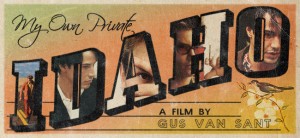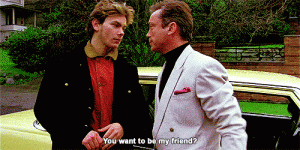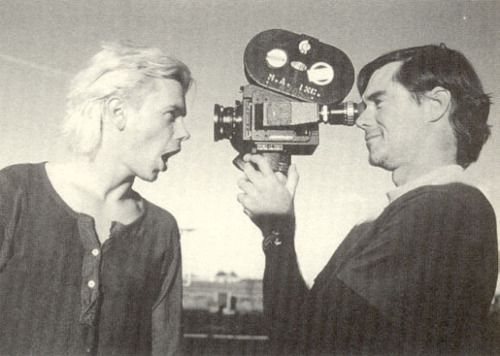When I had first watched the film My Own Private Idaho (1991), I was unaware of the specific references to Shakespeare’s Henry IV Parts I and II and Henry V. Categorized and hyped as a queer-road-western film by the press, the Shakespearean element was largely overlooked in favor of the then-shocking reality that beloved teen heartthrob and James-Dean-lookalike River Phoenix was portraying a gay street hustler type.
Achieving cult status after the untimely and premature death of River Phoenix in October 1993, the film has been ranked and met with critical acclaim by many critics as one of the best films of the 1990s and the best performances actors Keanu Reeves and Phoenix will find in years. The Shakespearean element, rather than taking away from the realistic portrayal of the independent film, actually adds to the picture in how it helps to justify the eccentric art cinema effects and underline the central themes of the film.
Perhaps my favorite anecdote from learning more about the creation of this film was the fact that the Shakespearean element was almost cut out entirely by director Gus Van Sant. At the behest of the executives at film distributor New Line Cinemas, who hated the Shakespearean dialogue and felt that it would draw ridicule to the film, they ordered Van Sant to cut out as much of the Shakespeare as possible. But, the foreign distributors apparently loved the Shakespeare and wanted as much of it in the final product as possible. This pressure by the foreign companies eventually persuaded New Line Cinemas to keep the dialogue in the film unchanged and distribute the original finished product. Thankfully Van Sant got his way and was able to create a film true to his vision and creative beliefs.

Actors River Phoenix, Keanu Reeves, and Rodney Harvey famously portrayed on adult magazines while speaking in paraphrased Shakespearean verse.
In the film, the references to Shakespeare’s Henry IV Part I are most apparent in the characters of Scott Favor (Keanu Reeves), Mike Waters (River Phoenix), Bob Pigeon (William Richert), and Mayor Jack Favor (Tom Troupe).
Although not the leading protagonist of the film, Scott Favor (Reeves) was written by Van Sant to embody the role of Henry V (Hal, Prince Harry in Henry IV Part I). Like Prince Harry’s character throughout the first couple acts of Henry IV Part I, Scott is a privileged but rebellious teenager whom interacts with the seedy underbelly of underground Portland. His father Jack Favor, the Mayor of Portland, symbolizes the role of King Henry IV who has a tumultuous relationship with his son’s hustling and degenerate ways. He is especially disapproving of Scott’s other patriarchal figure and fellow comrade Bob Pigeon who, as leader of the band of rebels and a wild storyteller, is reminiscent of the great Shakespearean creation Sir John Falstaff.
The scenes that appear to be pulled straight out of the Penguin edition of Shakespeare’s Henry IV Part I are the initial introduction scene of Harry and the highwayman Falstaff (1.2), the Gadshill robbery scene (2.1-3), the Falstaff-Harry bar scene (2.5), and Harry’s reconciliation with his father King Henry IV (3.2).
In a neo-Shakespearean method of dialogue, the characters inhabit their dual roles and move about the film with complex depth. Scott seas Bob as a real father to him and treat each other with affection and humor. Bob sees Scott and Mike as his sons and members of his family of street slummers and hustlers. But Scott, mirroring Prince Harry’s infamous monologue at the end of Act I Scene II, reveals that the friendship and pseudo-family he has with Falstaff and the other slummers is a disposable relationship established by circumstance:
Scott: When I turn twenty-one, I don’t want / any more of this life. My mother and / father will be surprised at the / incredible change. It will impress / them more when such a fuck up like / me turns good than if I had been a / good son all along. All the past / years I will think of as one big / vacation. At least it wasn’t as / boring as schoolwork. All my bad / behavior I’m going to throw away to / pay my debt. I will change when / everybody expects it the least. (source)
The language so readily identifies as paraphrased Shakespearean yet it has its own distinct coloring, a dusting of 90s-Pacific-Northwest-seedy-underground-teenage-angst-Machiavellianen-punk.
In addition to this scene in My Own Private Idaho, the death of Mayor Favor at the end of the film draws comparisons with both parts of Shakespeare’s Henry IV in that Scott is now the respectable and wealthy leader that his father wants him to be, and he has successfully carried out as successor to his father’s legacy of governmental service and a heteronormic lifestyle. Scott, who finds a wife in Italy by accident (as they are actually on a quest to locate Mike’s down-and-out mother), is made over in a suave new suit and tie and looks the part of the new Portland elite. He dispels all of his friends and harshly rejects his beloved friend and surrogate father figure Bob Pigeon, which is the scene that occurs at the end of Henry IV Part II, effectively cementing Henry V as the new King of England.
My Own Private Idaho is not the typical queer niche film that satisfies the art crowds, the critics and the LGBTQ community. It transcends that function. The film, through the dual storyline of Shakespeare’s Henry IV plays, reveals a lot about the human lives and world of street hustlers, family, and unobtainable love (another theme that prevalently shows up in Shakespeare’s work). Through the exploration of gay identity and love, this film draws forth humanity and realism. Shakespeare acts as a channel for these messages to be played out over the major part of the film and “shows us how to integrate diversity into a whole, albeit a complex whole – and one with a profound openness which we must each learn to navigate for ourselves” (Jim Clark).
Sources are all hyperlinked.



